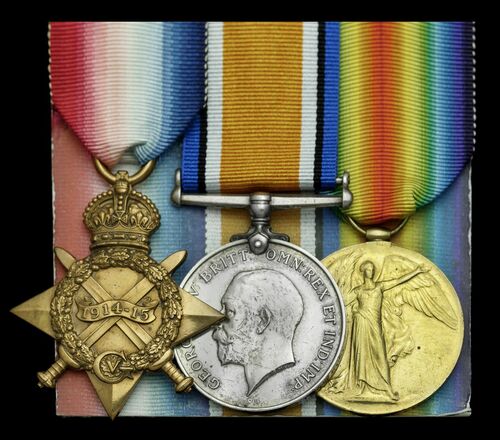
Auction: 24111 - Orders, Decorations and Medals - e-Auction
Lot: 481
A Great War campaign group of three awarded to Stoker 1st Class A. E. Warrey, Royal Navy, who was killed in action in H.M.S. Monmouth at the Battle of the Coronel in 1914
1914-15 Star (10320 A. E. Warrey, Sto. 1, R.N.); British War and Victory Medals (10320 A. E. Warrey, Sto. 1, R.N.), good very fine (3)
Albert Edward Warrey was born in Devonport on 14 January 1893, the son of Richard and Matilda Warrey, and joined the Royal Navy as a Stoker 2nd Class in February 1911. Shortly after the outbreak of hostilities in 1914, he transferred as a Stoker 1st Class from the depot ship Leander to the cruiser H.M.S. Monmouth, and he was likewise employed at the time of her loss at the battle of the Coronel.
Early in August 1914, a force, consisting of the old, armoured cruisers Good Hope and Monmouth, the light cruiser Glasgow and the armed merchant cruiser Otranto, all under the command of Rear-Admiral Sir Christopher Cradock, R.N., was sent to protect the southern trade routes and to intercept German cruisers operating on the high seas.
In October 1914, the squadron was reinforced by the addition of the old battleship Canopus but reports of the ship's lack of speed led the Admiral to leave her behind as he searched for the German East Asiatic Squadron. The German squadron, commanded by Admiral Graf von Spee, consisted of the armoured cruisers Scharnhorst and Gneisenau and the light cruisers Leipzig, Nurnberg and Dresden.
At 6.40 p.m. on 1 November, the squadrons made contact off Coronel, Chile and at 7.04 p.m. the battle opened at a range of 11,500 yards. As the German ships had a greater number of heavier guns, Cradock's tactics were to close the range to allow his ships' more numerous smaller calibre guns to come into play; this however was partly negated by the rough seas and high speeds which prevented many of the British armoured cruisers' casement guns being brought into action. The British armoured cruisers were repeatedly hit as the range was reduced, Good Hope blowing up with the loss of all hands at 7.53.
Monmouth, meanwhile, was seriously damaged and set on fire in a close encounter with Gneisenau, but she remained afloat after Admiral von Spee's larger vessels lost contact in the dark at 8.00 hours. At about 8.20, however, she was found by the German light cruiser Nurnberg, her engines still running and her steering gear undamaged. She did not haul down her flag or return fire but seemed to be turning, either to ram her opponent or to bring her starboard guns to bear. In consequence, Nurnberg opened fire again and Monmouth heeled over and capsized with the loss of her entire complement of 678 officers and ratings; the Glasgow and Otranto were able to make their escape under the cover of darkness.
For the Medals of his brother, who was killed in action at the Battle of Jutland, please see Lot 482.
Subject to 20% VAT on Buyer’s Premium. For more information please view Terms and Conditions for Buyers.
Sold for
£200
Starting price
£100




